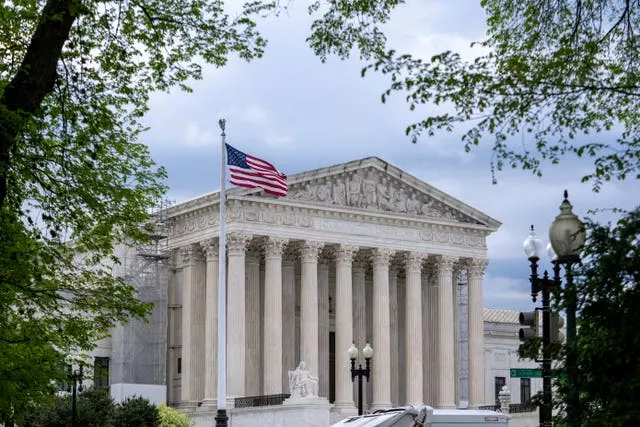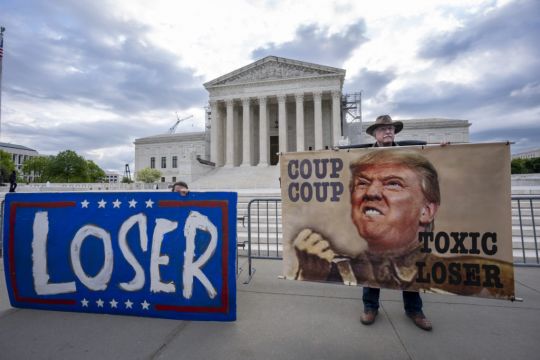US Supreme Court arguments have begun over whether former president Donald Trump can avoid prosecution over his efforts to overturn his 2020 election loss to Democrat Joe Biden.
The justices on Thursday took up for the first time whether a former president has absolute immunity from criminal charges for actions he took while in office, as Mr Trump claims.
He is the first former president to be charged with crimes.
Mr Trump had said he wanted to be at the Supreme Court on Thursday.
Instead, he was in court in New York, where he is on trial on charges that he falsified business records to keep damaging information from voters when he directed hush money payments to a former porn star to keep quiet her claims that they had a sexual encounter.
The timing of the Supreme Court’s decision could be as important as the outcome.

Mr Trump, the presumptive 2024 Republican presidential nominee, has been pushing to delay the trial until after the November election, and the later the justices issue their decision, the more likely he is to succeed.
Special counsel Jack Smith’s team is asking for a speedy resolution. The court typically issues its last opinions by the end of June, about four months before the election.
Mr Trump’s lawyers say that former presidents are entitled to absolute immunity for their official acts.
Otherwise, they say, politically motivated prosecutions of former occupants of the Oval Office would become routine and presidents could not function as the commander in chief if they had to worry about criminal charges.
Lower courts have rejected those arguments, including a unanimous three-judge panel on an appeals court in Washington, D.C.
The election interference conspiracy case brought by Smith in Washington is just one of four criminal cases confronting Mr Trump.
Mr Smith’s team says the men who wrote the Constitution never intended for presidents to be above the law and that, in any event, the acts with which Mr Trump is charged, including participating in a scheme to enlist fake electors in battleground states won by Mr Biden, are not in any way part of a president’s official duties.
Nearly four years ago, all nine justices rejected Mr Trump’s claim of absolute immunity from a district attorney’s subpoena for his financial records.
That case played out during Mr Trump’s presidency and involved a criminal investigation, but no charges.
Justice Clarence Thomas, who would have prevented the enforcement of the subpoena because of Mr Trump’s responsibilities as president, still rejected Mr Trump’s claim of absolute immunity and pointed to the text of the Constitution and how it was understood by the people who ratified it.
“The text of the Constitution does not afford the President absolute immunity,” Mr Thomas wrote in 2020.
The lack of apparent support on the court for the sort of blanket immunity Mr Trump seeks has caused commentators to speculate about why the court has taken up the case in the first place.
Phillip Bobbitt, a constitutional scholar at Columbia University’s law school, said he worries about the delay, but sees value in a decision that amounts to “a definitive expression by the Supreme Court that we are a government of laws and not of men”.
The court also may be more concerned with how its decision could affect future presidencies, Harvard law school professor Jack Goldsmith wrote on the Lawfare blog.
But Kermit Roosevelt, a law professor at the University of Pennsylvania, said the court never should have taken the case because an ideologically diverse panel of the federal appeals court in Washington adequately addressed the issues.
“If it was going to take the case, it should have proceeded faster, because now, it will most likely prevent the trial from being completed before the election,” Mr Roosevelt said.
“Even Richard Nixon said that the American people deserve to know whether their president is a crook. The Supreme Court seems to disagree.”
The court has several options for deciding the case. The justices could reject Mr Trump’s arguments and unfreeze the case so that US District Judge Tanya Chutkan can resume trial preparations, which she has indicated may last up to three months.
The court could end Mr Smith’s prosecution by declaring for the first time that former presidents may not be prosecuted for official acts they took while in office.
It also might spell out when former presidents are shielded from prosecution and either declare that Mr Trump’s alleged conduct easily crossed the line or return the case to Ms Chutkan so that she can decide whether Mr Trump should have to stand trial.







